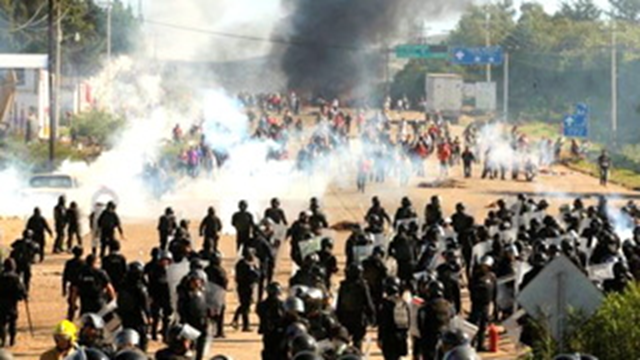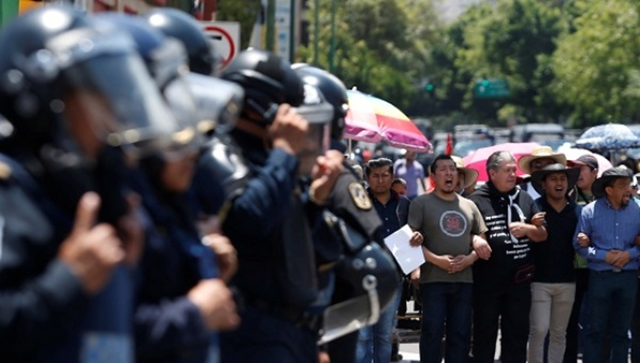Mexico teacher protests gain steam as hundreds set to be fired, after six killed in police crackdown – ‘As soon as they arrived, they began to attack. And we were few, very few.’
11 July 2016 (teleSUR) – Deepening neoliberal education reforms, Mexican government officials plan to fire or lay off more than 350 teachers in the southern state of Guerrero, even as they prepare to continue negotiations Monday with striking parents, teacher and activists in the state of Oaxaca who have been protesting similar school reforms for weeks. Leaders of the country´s national teachers union, known by the Spanish acronymn, CNTE, have called for another massive demonstration Monday afternoon, marching from the presidential palace in Mexico City to the Interior Ministry, where union negotiators will meet for a fourth time with government education officials. At issue are the neoliberal education reforms implemented in 2013 by President Enrique Peña Nieto. The CNTE contends that the measures, which greatly expand the testing of teachers, have failed to improve student education, and demand an overhaul to the national classroom model. The three previous meetings between the union and Interior Minister Osorio Chong have failed to bear meaningful results, and CNTE officilals say that concrete steps need to be taken to break the impasse. But the government seems to be taking steps in the opposite direction. According to the Mexican daily La Jornada, education officials resumed rolling out their neoliberal agenda over the weekend — after a brief hiatus to ensure peaceful local elections last month — annoucing a new wave of over 500 mandatory teacher performance evaluations in Guerrero, one of the states where the CNTE’s presence is strongest. Teachers contend that the evaluations are punitive, and some have boycotted the move. Government officials say that they will now fire 220 teachers in Guerrero for missing their reviewss as far back as seven months ago, while another 123 are scheduled to be laid off for missing classes while striking. Dozens more face tens of thousands of dollars in salary deductions for failing to show up for class. Education Minister Aurelio Nuño has refused to meet with striking teachers unless they agree to contested reforms beforehand, and Saturday, some 2,500 teachers took to the streets in support of the national struggle to demand Nuño resign. Meanwhile, the CNTE has also joined in solidarity with the families of the 43 Ayotzinapa students disappeared in Iguala, Guerrero in 2014, continuing to press authorities for an independent and thorough investigation into the murders. Human rights reports suggest that local police stopped the bus transporting the students to a rally to commemorate the student causalties of a 1968 massacre in Mexico City, and parents, activists and teachers accuse the government of writing its own “historical truth” of Ayotzinapa. More than 100 CNTE members rallied with Ayotzinapa families in front of the Attorney General’s office in Mexico City Monday as the movement launched a “new stage” that is focused on peaceful protest rather than government meetings that have produced few results. Ayotzinapa representatives have repeatedly slammed authorities for failing to follow through on promises made behind closed doors. […] Meanwhile, blockades in Oaxaca are also ongoing, with the support of the Zapatista movement providing several tons of food and supplies in the wake of a violent confrontation last month which left 6 civilians dead. Human rights defenders slammed the government for excessive use of force, arbitrary arrests, and extrajudicial killings during protests in Nochixtlan. [more]
Mexico Teacher Protests Gain Steam as Hundreds Set to be Fired 
21 June 2016 (Democracy Now!) – In the southern Mexican state of Oaxaca, a deadly police crackdown against teachers has left nine people dead and more than 100 wounded. On Sunday, police descended on teachers in the community of Nochixtlán, where they had set up blockades to protest against neoliberal education reform and the arrests of two teachers’ union leaders last week on what protesters say are trumped-up charges. “As soon as they arrived, they began to attack. And we were few, very few,” said a Oaxacan teacher. “Then we started running. But they began to attack right away, instantly. At no time did they give warning to clear the area.” We go to Oaxaca to speak with Gustavo Esteva, founder of the Universidad de la Tierra in Oaxaca and author of many books, including “New Forms of Revolution.” Click here to watch Part 2 of our conversation. AMY GOODMAN: We end our show in the southern Mexican state of Oaxaca, where a deadly police crackdown against teachers has left at least eight people dead, more than a hundred wounded this week. On Sunday, police descended on teachers in the community of Nochixtlán, where they had set up blockades to protest against neoliberal education reforms and the arrests of two teachers’ union leaders last week on what protesters say are trumped-up charges. Democracy Now! correspondent Andalusia Knoll traveled to the area and interviewed survivors of Sunday’s deadly attack. This is a teacher, who did not give her name for her safety.
NOCHIXTLÁN TEACHER: [translated] As soon as they arrived, they began to attack. And we were few, very few. Then we started running. But they began to attack right away, instantly. At no time did they give warning to clear the area. They began to attack right away. And the impotence caused by the media, who said that they did not shoot their weapons. We just went to corroborate with the tire shop about where they fired at us from. We guarded our front side. We still don’t know how they fired at us. And so we guarded our front side. But we realize that if they were positioned like this, then they were already hunting us from afar. Now we understood why. The dead were killed from over there and not exactly from the front.
We are going to stay here until the government is willing to talk. If tomorrow the government is open to dialogue, then the conflict ends. The governor wants what he calls educational reform. And what we want is a dialogue for the kind of change that the people require, the kind that meets their needs. If you go to our communities, there are many needs. How are the kids doing? The children can’t go to school to learn. All they think about is eating, because they don’t eat. No one can learn if they don’t sleep well, if they walked many miles to go to school. So the government should go and see what happens firsthand. And until there is a dialogue, we will not end our protest demanding educational reform. And who will revive our dead? The dialogue won’t bring our dead back to life. And those who are imprisoned, there aren’t just five or 10, there are thousands.
AMY GOODMAN: Well, for more on the protests in Oaxaca, Mexico, we’re joined by Gustavo Esteva, founder of the Universidad de la Tierra in Oaxaca, University of the Land, author of many books, including New Forms of Revolution. Gustavo has also been a columnist for La Jornada. Gustavo, in this last two minutes we have, please explain what happened this week. GUSTAVO ESTEVA: Well, first, we had a very bloody battle. It is—until now, we had a report of nine executed, assassinated, 23 disappeared, at least 21 arrested, 45 in the hospital, more than a hundred injured. It is—was a very bloody, long-announced battle. It was the—it is the beginning of the war. And we are surprised and amazed that the authorities are following the script, literally the script of 10 years ago—first the teachers’ mobilization, then the sit-in, then the repression. This is a very complex war. It doesn’t—it did not start in Oaxaca. The teachers’ struggle, it is a global struggle. It started in Colombia, in Brazil, in Chile, in the U.S.—everywhere. And today we are in a war trying to say a very firm no to this kind of education. It is useless instruction. We are discussing education. We have a plan of education. We can offer an alternative for—of education. And we are saying no very firmly to all the so-called structural reforms that mean basically a change of only ownership. They are selling our land, our territory. The people are resisting. And then we are resisting with them to oppose this kind of operation. This is a very complex war that just started. We are at the beginning of this very complex war against us, against our territory. [more]
“The Battle Has Just Started”: Activists Denounce Police Killings & Crackdowns on Teachers in Oaxaca 
By Laura Tillman
20 June 2016 (Los Angeles Times) – Violent clashes in the southern state of Oaxaca between police and members of a teachers union resulted in six civilian deaths and more than 100 injuries on Sunday, recalling the extended standoff between unionized teachers and police a decade ago that crippled the state. The protests center on sweeping education reforms, heralded by President Enrique Peña Nieto, which require the testing of teachers in an effort to improve the country’s abysmal public education system. Oaxaca’s branch of the National Coordinator of Education Workers, or CNTE, clashed with police after union leaders were arrested on money laundering and other charges last week. On Monday, Peña Nieto said he regrets the loss of human life and pledged to punish the responsible parties. “I’ve given instructions so that, within the framework of the law, the necessary actions will be taken to resolve the conflict,” he said via Twitter. Four hundred federal police and 200 state police were sent to remove a roadblock on Sunday morning in Nochixtlan, north of Oaxaca City, that had been set up on a highway by protesters, according to the state’s outgoing governor, Gabino Cue Monteagudo. Monteagudo said that events turned violent when protesters captured five federal police officers and a rescue effort began. Protesters threw rocks and Molotov cocktails and burned vehicles, and teachers have set up an encampment in Oaxaca City’s main square, the Associated Press reported. Oaxaca has long been known as a tourist haven for lovers of food, art and architecture. It’s also home to 16 indigenous groups and a long and complex tradition of social movement. Sunday’s eruption is just the latest chapter in a conflict between the federal government and a group of highly organized teachers. “I suspect this confrontation is about more than education reform,” said professor Lynn Stephen, director of the Center for Latino/a and Latin American Studies at the University of Oregon. “It’s about something much more profound: the poverty and growing inequality in the country, and the impunity.” […] Edith Santibañez, a representative of the union, said that none of the members at the roadblock were armed and that the Molotov cocktails were thrown by protesters who had infiltrated the crowd. “We want to make it clear that it was not us, it was people who want to destabilize our struggle,” Santibañez said. “We deny attacking police. Instead, the police attacked us with guns and shot at people when we’re exercising our right to protest.” [more]
6 die in violent clashes between police and teachers union in Mexico
